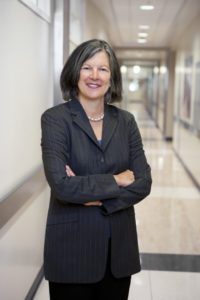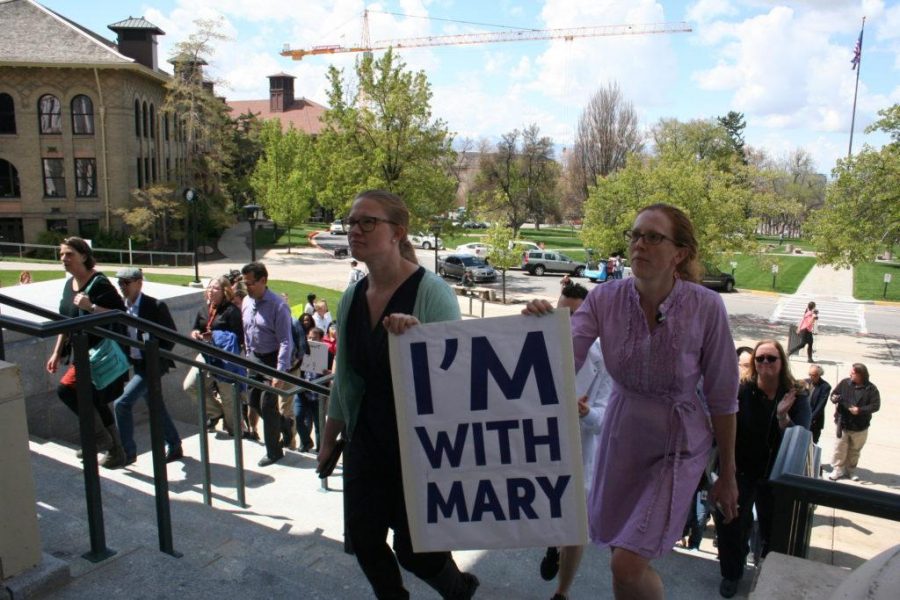Monday afternoon, according to Huntsman Cancer Institute (HCI) employees, University of Utah President David Pershing emailed Mary Beckerle to notify her that she had been dismissed from her position as CEO and Director of HCI. The next morning, faculty and staff received an email from University of Utah Health CEO Vivian Lee explaining that Beckerle would no longer work at HCI, but would retain her position as a distinguished professor in biology. The email gave no reason for Beckerle’s dismissal, and said Kathleen Cooney, chair of the Department of Internal Medicine at the U’s hospital, would be interim CEO and director of the institute.
Jon Huntsman, Sr. founded HCI a little over 20 years ago when he gave the U a $100 million donation to start what he called a “cancer campus” for the purposes of researching and treating cancer. The disease has killed several of his family members and he has suffered from it four times.
Over the next few years, HCI occasionally struggled, especially with funding. Huntsman made donations even when his own business wasn’t doing well, sometimes taking out loans to keep the institute afloat.
According to HCI researcher Bruce Edgar, Beckerle was named CEO and director 11 years ago when the institute was in decline. A petition written by a group of HCI employees demanding the U reinstate Beckerle said that when she was first hired, “HCI was on the brink of losing its status as a National Cancer Institute-designated Cancer Center.” The designation is given only to cancer centers which meet high standards for both scientific research and patient care, and it helps the institute hire highly sought after researchers.
After she was appointed director and CEO, Beckerle guided the institute to its current standing as one of the top five cancer centers in the nation. HCI claims discovery of “more inherited cancer genes than any other cancer center in the world.” She led the institute beyond just retaining it’s cancer center status to receiving the highest designation given by the National Cancer Institute (NCI) — that of a comprehensive cancer center. There are fewer than 50 in the country, mostly concentrated on the coasts. Not every state has a comprehensive cancer center, and Huntsman Cancer Institute is Utah’s only one.
According to the petition, NCI recently rated Beckerle as exceptional — it’s “highest rating for leadership.”
Beckerle was involved with former Vice President Joe Biden’s Cancer Moonshot initiative, and testified before congress less than a month ago on the importance of continued federal funding for cancer research.

Researchers and staff members say Beckerle made Huntsman Cancer Institute what it is today. According to Jody Rosenblatt, a researcher at HCI and a professor in the U’s School of Medicine, “Mary is the one that really put the Huntsman Cancer Institute, and I would say the University of Utah, on the map.”
It’s unclear why she was dismissed from her position as the head of HCI.
Kathy Wilets, a spokesperson for University of Utah Health, declined to comment, saying “We understand emotions are running high but as you can imagine, out of respect for everyone involved, we can’t provide further information about personnel issues”.
President Pershing, Lee, and Beckerle herself did not respond to requests for comment. The U’s Board of Trustees, which was involved in the decision to dismiss Beckerle according to Lee’s email, also declined to comment.
Things have been “chaotic” at HCI since Beckerle was dismissed, according to an employee who requested to remain anonymous.
“Most everyone from lab techs to professors are upset about the situation and how it was handled,” she said. “Everyone loves Mary, and thinks she has been a great leader and has done nothing but good for HCI on the whole. The announcement really blind-sided everyone.”
Another employee who agreed to comment anonymously said the U “has tried over the years to just fold in HCI with the rest of [the hospital’s] departments, and remove our uniqueness. A lot of people think this is a power play to get full control over HCI, which could also include redirecting our revenues to other things besides cancer research.”
Although HCI is formally overseen and its staff is hired and paid by the U, operation of the institute is semi-autonomous. According to Edgar, this model is not compatible with University of Utah Health’s idea of how HCI should be run. He said they want to unify the institute with the hospital. According to him, this would give hospital administrators control over what the institute does, the space it uses and how much money it gets.
HCI costs approximately $120 million a year to run, and it relies primarily on three sources of funding — a percentage of the revenues from the cancer hospital, private donations and grants from government agencies. Edgar said that if hospital administrators had full control over HCI, they could potentially redirect proceeds from the cancer hospital away from cancer research to University Hospital.
Rosenblatt said that she and other researchers will take positions at other institutions if Beckerle isn’t reinstated.
“When we’re getting offers to work at places that have already made it, and we’re staying because we think [HCI] has a great trajectory then all of a sudden the trajectory changes to just freefall, I think that a lot of people will leave,” she said. “It would be substantial enough to destroy the research here.”
The institute is in the process of recruiting new researchers. Those already working at HCI are concerned that the dismissal of Beckerle will discourage scientists from joining the institute.
“How do we tell them that everything is fine, when we feel very insecure?” said Rosenblatt.
Edgar extended this concern to the potential hiring of a new director and CEO. He said the move damages HCI’s reputation along with the U’s, and that if the cancer institute were to be fully integrated into the U’s hospital, the lack of resources and autonomy will discourage candidates from taking the job.
Many researchers have come to HCI because of the unique identity of the institute, partially due to its autonomy from the U.
“[HCI] wasn’t started by the U, wasn’t funded by the U and wasn’t built by the U,” said Edgar. “If we become a run-of-the-mill treatment center, we won’t be able to hire”.
Wednesday afternoon, he and hundreds of HCI employees marched from HCI to the doors of the Park Building where President Pershing’s office is located, protesting Beckerle’s dismissal. They presented his staff with the petition to reinstate her, bearing over 1,500 signatures.
Later that day, University of Utah Health released a statement that said, “As we look to the future, we believe closer collaboration between HCI and the rest of the university will further strengthen HCI for the benefit of our patients and enable us to apply the combined talent and resources of the university’s entire health system.”
The statement appears to confirm researchers’ suspicions that the U’s intention in firing Beckerle was to gain more control over HCI and integrate it into the U’s hospital system.
Researchers and other HCI employees aren’t the only ones shocked by the U’s dismissal of Beckerle. The Huntsman family, who continue to be the largest single source of funding for the institute, says they weren’t consulted.
“Why this changed and why this had to happen, I guess nobody still knows why,” said Peter Huntsman, CEO of the Huntsman Foundation and Huntsman Cancer Foundation, as well as Jon Huntsman, Sr.’s son.
Huntsman Cancer Foundation is a non-profit organization run by the Huntsman family, and the medium through which donations are disbursed to the institute.
“Huntsman Cancer Foundation will always be guided by putting the patient first… In doing so, we expect excellence in all that is done at the cancer institute,” said Susan Sheehan, President and COO of the foundation. “Dr. Beckerle provides outstanding leadership in carrying these values forward and her track record in advancing the cancer program is exceptional as measured against standards of the National Cancer Institute and cancer thought leaders throughout the US. We are deeply dismayed and disappointed by the leadership change announced by the University.”
Jon Huntsman, Sr. met with HCI staff Tuesday morning to express his disappointment and anger at Pershing and Lee, saying he wants them to reverse their decision. According to Edgar, he also explained that he was negotiating a $250 million donation with U administrators and that he would condition his donation upon Beckerle’s reinstatement and HCI’s continued autonomy. Huntsman told them he would do what it took to see Beckerle reinstated as CEO and Director, including taking legal action.
“If litigation is going to be needed to try to get things back to where they were, to try to do what’s best for the patients and so forth, that’s an avenue that we certainly will explore,” said Peter Huntsman.
Edgar said the institute is now in a “vulnerable” place and feels “it’s in danger of falling apart” not just because it may be unable to attract new researchers or retain those currently working, but because the Huntsman family could withdraw support.
“HCI is recognized by its peers as being one of the finest cancer centers in the world,” said Peter Huntsman. “It got there because of the hard work of Mary and all of the wonderful people who have made that institution what it is. I suppose it’s gotten there in part because of the hundreds of millions of dollars that my parents have generously given, and thousands of other donors have given to HCI as well. They’re wondering, ‘Should I keep giving? If I give to the cancer foundation, I want it going toward cancer care.’”
e.vandersteen@dailyutahchronicle.com
@EliseAbril
e.anderson@dailyutahchronicle.com
@emilyinorgandy




John_St_John • Apr 23, 2017 at 3:04 pm
Well researched and written. Thank you.
Dave Maynard • Apr 21, 2017 at 1:31 pm
very helpful article but you buried your lede with the $250 mil donation discussion contigent on Beckerle reinstatement
Elise Vandersteen Bailey • Apr 24, 2017 at 11:11 am
Dave: when I was writing this article, I was going more for an explainer of a very complex, multifaceted issue than for a splashy headline–particularly considering that several other outlets had already reported on the donation discussions. However, I do appreciate that the discussions are an important part of what’s going on.
In any case, thank you for your feedback.
Bob • Apr 21, 2017 at 10:41 am
Great comprehensive article for where things stand at present. WAY better than the nightly news nonsense.
Annon22 • Apr 20, 2017 at 10:30 pm
Wow, incredibly well written, waaaaay better than the Trib.
Anonymous • Apr 20, 2017 at 3:47 pm
Elise, this is probably one of the best written reports yet on this event. Coming fromsomeone closely affiliated with this event, I appreciate your article and it’s factual clarity. I have seen so many drama driven articles from mainstream media and this is a relief to read. Thank you so much.